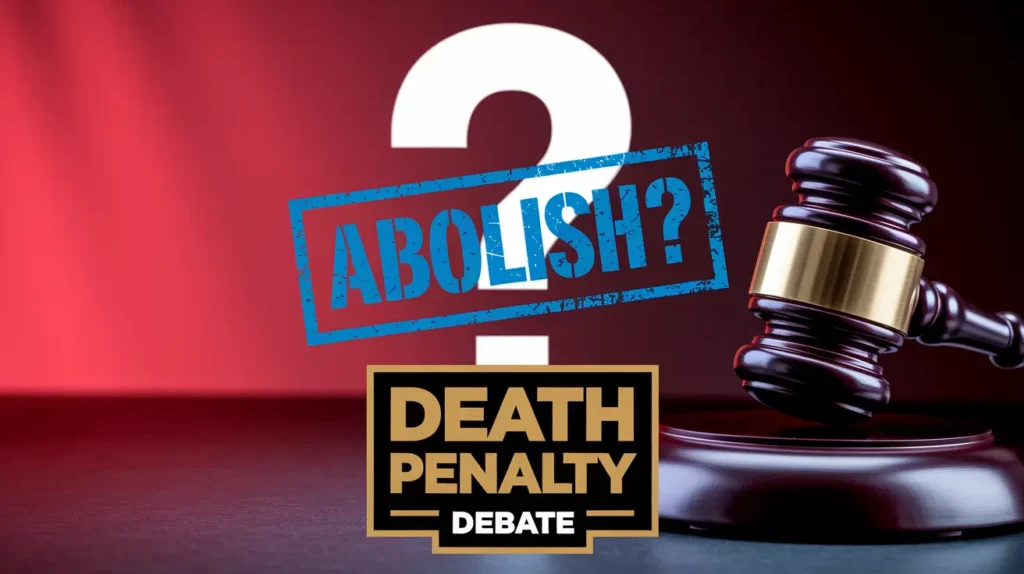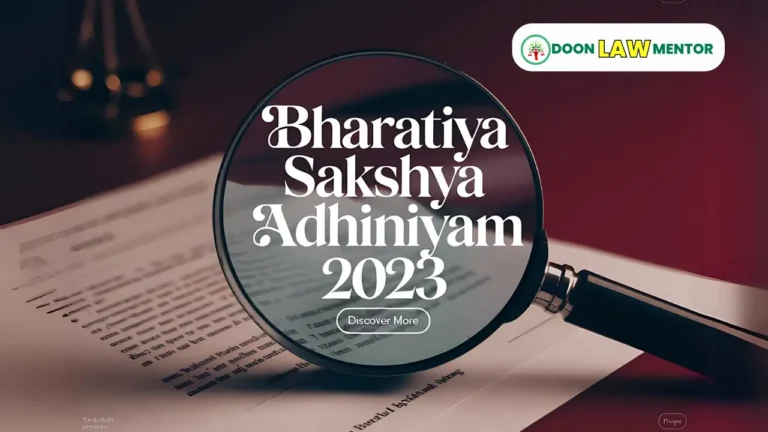The debate on death penalty in India continues to spark discussions among legal experts and society. Should India abolish it in 2025? This blog explores the arguments for and against the death penalty, its legal status, and what it means for the justice system.
Table of Contents
Introduction
The debate on death penalty in India has been a topic of discussion for many years. The death penalty, also called capital punishment, is when the court orders someone to be executed for a very serious crime. In India, this punishment is given in the “rarest of rare” cases, like for terrorism or brutal murders. But many people ask: should India abolish the death penalty?
The debate on death penalty involves legal experts, human rights activists, and the public, with strong arguments on both sides. Landmark judgments by the Supreme Court have shaped how this punishment is used, making it a key topic for lawyers and judiciary aspirants. In this blog, we’ll look at the debate on death penalty, the arguments for keeping it, the reasons to abolish it, landmark cases that define its legal status, and what it means for India’s future.
1. What Is the Death Penalty in India?
The death penalty is a legal punishment in India where a person is executed for committing a very serious crime. It is allowed under the Bharatiya Nyaya Sanhita (BNS), India’s new criminal law. For example, Section 111 of the BNS allows the death penalty for organized crime if it leads to someone’s death, and it’s also given for crimes like terrorism or mob lynching. The Supreme Court of India has set strict rules for using this punishment, saying it should only be used in the “rarest of rare” cases. The debate on death penalty often focuses on whether this punishment is fair and if it should still exist in a modern justice system.
2. Arguments in Favor of Keeping the Death Penalty
Many people in India support the death penalty, and their arguments are a big part of the debate on death penalty. Here’s why they want to keep it:
- Deters Serious Crimes: Supporters believe the death penalty stops people from committing big crimes like murder or terrorism. The fear of being executed can make criminals think twice before acting.
- Justice for Victims: In cases of brutal crimes, families of victims often demand the death penalty. For example, in the Nirbhaya case, where a young woman was brutally assaulted and murdered, the public and the victim’s family demanded the death penalty for the accused. The court agreed, and the accused were executed, giving closure to the family.
- Protects Society: The death penalty removes dangerous criminals from society forever. For instance, terrorists who plan attacks can’t harm more people if they are executed.
- Legal Support from Courts: The Supreme Court has upheld the death penalty in several cases, saying it’s a valid punishment under the law. This legal backing strengthens the argument to keep it in the debate on death penalty.
These points show why some people believe the death penalty should remain part of India’s justice system.
3. Arguments for Abolishing the Death Penalty
On the other side of the debate on death penalty, many people want India to abolish this punishment. Here are their reasons:
- Risk of Wrongful Execution: Sometimes, innocent people are convicted due to mistakes in the legal process, like false evidence or poor investigation. If they are executed, there’s no way to correct the mistake. For example, in the case of Machhi Singh v. State of Punjab (1983), the Supreme Court later reviewed its own decisions and raised concerns about wrongful convictions in death penalty cases.
- No Proof It Stops Crime: Many experts say there’s no clear evidence that the death penalty reduces crime more than life imprisonment. Countries that abolished it, like Canada, didn’t see a rise in crime rates.
- Violates Human Rights: Human rights activists argue that the death penalty goes against the right to life, which is protected under Article 21 of the Indian Constitution. In Mithu v. State of Punjab (1983), the Supreme Court struck down a mandatory death penalty provision, saying it violated the right to life and was unfair.
- Unequal Application: The death penalty is often given to people from poor or marginalized communities who can’t afford good lawyers. This makes the punishment unfair and biased, a concern raised in many Supreme Court discussions.
These arguments highlight why many believe India should abolish the death penalty in the debate on death penalty.
4. Legal Status of the Death Penalty in India with Landmark Judgments
The debate on death penalty also looks at the current laws and landmark judgments that have shaped its use in India. The death penalty is legal under the Bharatiya Nyaya Sanhita (BNS). It’s given for serious crimes like:
- Terrorism that causes death.
- Mob lynching based on religion or caste.
- Extreme harm to children, like in cases of rape and murder.
The Supreme Court has played a big role in defining how the death penalty is used through landmark judgments:
- Bachan Singh v. State of Punjab (1980): This is one of the most important cases in the debate on death penalty. The Supreme Court introduced the “rarest of rare” doctrine, saying the death penalty should only be given in the most extreme cases where the crime is so brutal that no other punishment fits. The court also said judges must consider both the crime and the criminal’s background, like their age, mental health, or reasons for committing the crime, before deciding on the death penalty.
- Machhi Singh v. State of Punjab (1983): This case added more guidelines to the “rarest of rare” doctrine. The Supreme Court listed factors to decide if a case qualifies, such as the brutality of the crime, the motive, and the impact on society. For example, crimes that shock the public’s conscience, like mass murder, could qualify for the death penalty.
- Santosh Kumar Bariyar v. State of Maharashtra (2009): In this case, the Supreme Court emphasized that the death penalty should not be given if there’s any chance the criminal can reform. The court said life imprisonment should be the first choice unless the criminal is a clear danger to society. This judgment made the use of the death penalty even stricter.
- Shatrughan Chauhan v. Union of India (2014): This case addressed delays in executing the death penalty. The Supreme Court ruled that long delays in carrying out the execution, especially if the person is on death row for years, violate their rights under Article 21. The court allowed mercy petitions to be filed in such cases, showing a more humane approach.
These landmark judgments show that while the death penalty is legal, the Supreme Court has set strict rules to ensure it’s used fairly and only in the most extreme cases. However, the debate on death penalty continues because some feel these rules are still not enough to make the punishment fair.
5. Global Perspective on the Death Penalty
The debate on death penalty in India is also influenced by what other countries are doing. Many nations have abolished the death penalty, and this adds to the argument for India to do the same:
- Abolishment Trend: Over 140 countries have abolished the death penalty, either in law or in practice. Countries like the UK, Australia, and South Africa no longer use it and have not seen a rise in crime.
- Retentionist Countries: Some countries, like the USA, China, and Saudi Arabia, still use the death penalty. However, even in the USA, many states have stopped using it due to concerns about fairness and human rights.
- International Pressure: Groups like the United Nations and Amnesty International push for abolishing the death penalty worldwide. They argue it’s a cruel punishment that doesn’t fit with modern human rights standards, a point often raised in the debate on death penalty.
This global view adds weight to the discussion in India, as many ask if India should follow the global trend.
6. What Would Abolishing the Death Penalty Mean for India?
If India abolishes the death penalty, it would have a big impact on the justice system and society. The debate on death penalty often looks at these effects:
- Shift to Life Imprisonment: Without the death penalty, the harshest punishment would be life imprisonment. The BNS already defines life imprisonment as the entire life in jail, which can still protect society from dangerous criminals. The Supreme Court’s ruling in Swamy Shraddananda v. State of Karnataka (2008) supported this by saying life imprisonment for the entire life can be a strong alternative to the death penalty.
- Focus on Reform: Abolishing the death penalty could lead to more focus on reforming criminals. Programs to help them change their behavior could reduce crime in the long run, as seen in cases like Santosh Kumar Bariyar where the court favored reform over execution.
- Legal Reforms: The justice system would need to improve to avoid wrongful convictions. This means better investigations, more forensic evidence, and fair trials for everyone, addressing concerns raised in cases like Machhi Singh.
- Public Reaction: Some people might oppose abolishing the death penalty, especially victims’ families who want justice for brutal crimes, like in the Nirbhaya case. The government would need to address these concerns while ensuring fairness.
These impacts show that the debate on death penalty is not just about the punishment itself but also about how India’s justice system works.
Conclusion
The debate on death penalty in India raises important questions about justice, fairness, and human rights. Supporters say it deters crime, protects society, and gives justice to victims, as seen in cases like Nirbhaya. Opponents argue it risks executing innocent people, doesn’t reduce crime, and violates human rights, a view supported by judgments like Mithu v. State of Punjab. Landmark cases like Bachan Singh and Machhi Singh have set strict rules for using the death penalty, but the debate on death penalty continues due to concerns about fairness and global trends where many countries have abolished it.
For lawyers and judiciary aspirants, understanding this debate and the landmark judgments is crucial because it shapes the future of criminal law. Whether India abolishes the death penalty or not, the focus should be on creating a justice system that is fair, effective, and respects human rights for everyone.
Want to dive deeper into the debate on death penalty for your Judiciary Exam? Join Doon Law Mentor’s Courses for expert guidance and study materials! Follow @doonlawmentor on Instagram for the latest updates!
FAQs
- What is the debate on death penalty in India?
The debate on death penalty is about whether India should keep or abolish the death penalty as a punishment for serious crimes. - Why do some people support the death penalty?
They believe it stops serious crimes, gives justice to victims, and protects society from dangerous criminals. - Why do some people want to abolish the death penalty?
They say it risks executing innocent people, doesn’t reduce crime, and violates human rights. - What crimes can lead to the death penalty in India?
Serious crimes like terrorism, mob lynching, and extreme harm to children can lead to the death penalty under the BNS. - What does the Supreme Court say about the death penalty?
In Bachan Singh v. State of Punjab, the court said it should only be used in the “rarest of rare” cases, considering the crime and the criminal’s background. - Have other countries abolished the death penalty?
Yes, over 140 countries have abolished it, including the UK and South Africa, without seeing a rise in crime. - What would happen if India abolishes the death penalty?
The harshest punishment would be life imprisonment, and the focus might shift to reforming criminals. - How does the death penalty affect the justice system?
It raises concerns about fairness, wrongful convictions, and the need for better legal processes, as seen in cases like Machhi Singh. - Why should judiciary aspirants study this debate?
It’s an important topic for Judiciary Exams and understanding the future of criminal law in India. - Where can I learn more about the death penalty debate?
Join coaching classes or read legal resources to understand the arguments and landmark judgments.










